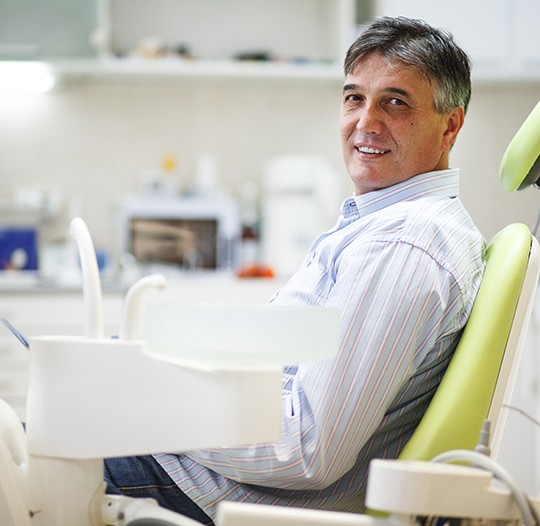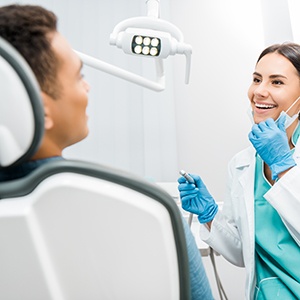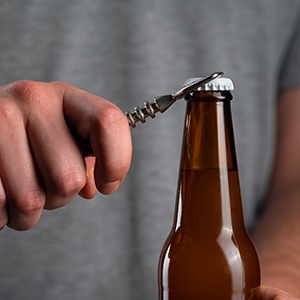Emergency Dentist Idaho Falls
Here to Quickly Help Your Hurting Smile

Sometimes life can throw us a curveball – but when it comes in the form of a dental emergency, it isn’t always clear how you should handle things. However, the very last thing you should do is panic; this will only make things more difficult! Instead, give Dr. Jenkins and our team here at Discover Family Dental a call. We offer same-day treatment for all kinds of urgent and painful dental situations. If you or a loved one need an emergency dentist in Idaho Falls, contact us for assistance!
Why Choose Discover Family Dental for Emergency Dentistry?
- Hometown Dentist with Years of Experience
- Same-Day Emergency Appointments Available
- Insurance Accepted and Flexible Financing Options
How We Treat Dental Emergencies

As nice and convenient as it would be, dental emergencies don’t resolve on their own; in fact, things tend to worsen without professional care. With that in mind, if you or someone you know suffers a dental emergency in Idaho Falls, here are three simple steps you can follow:
- Call Our Office – As soon as you realize you’ve hurt your smile, call our office and describe your symptoms over the phone. We’ll let you know if you need to come in ASAP, and in any case, we can provide you with first-aid tips over the phone.
- Attend Your Same-Day Appointment – Not all emergencies require same-day care, but if yours do, rest assured that Dr. Jenkins wants to get you out of pain immediately. Once you’re here, we can perform an examination, take X-rays if needed, and begin determining the best course of treatment.
- Receive Urgent Care – Once we know how to treat your situation, we’ll work quickly to resolve your discomfort and ensure that everything is okay with your mouth. This might involve one or multiple different treatments; however, we’re firmly committed to helping you leave without dental pain!<
The Most Common Dental Emergencies
Believe it or not, it’s very possible to suffer a dental emergency and also not experience any outright pain – but this doesn’t mean your situation isn’t serious! What’s worse is that a lack of pain might be a sign of something more serious. That’s why you shouldn’t hesitate to call our Idaho Falls office and explain what happened, so we can start going over your next steps. In the meantime, here’s a brief list of some of the most common dental emergencies we can treat here at our office:
Keys to Preventing Dental Emergencies

Dr. Jenkins isn’t just here to help with toothaches, loose dental crowns, bleeding gums, and other dental trouble; he’s here to provide preventive care that keeps your smile happy and healthy! Below, you will find a few of the habits we recommend incorporating into your routine (as well as a few we recommend avoiding) to reduce your risk of needing same-day dental care.
Visit Us Every Six Months

Has it been more than six months since your last dental checkup and cleaning? If so, call us to schedule a visit with Dr. Jenkins! That way, he can complete a comprehensive oral exam, looking for warning signs of oral cancer, tooth decay, gum disease, and other dental problems in the process. If he notices anything concerning, he will bring it to your attention, review your treatment options, and answer any questions you have about your oral health.
Brush and Floss Consistently

Brushing for two full minutes each morning and evening will help prevent food particles, plaque, and other debris from accumulating. However, your oral hygiene regimen is ultimately incomplete if you don’t floss and rinse with mouthwash consistently as well. So, make sure that you’re incorporating all three of these steps into your daily routine!
Eat Lots of Nutrient-Dense Foods

Some foods, like seasonal fruits and vegetables, are packed with essential nutrients that help keep your teeth and gums healthy from the inside out. Other foods, like hard pretzels, peanut brittle, and lollipops, increase your risk of dental damage – from small chips to serious fractures. That’s why it’s so important to be mindful of what you eat!
Wear a Mouthguard During Sports

There’s a common misconception that mouthguards are only needed when participating in contact sports. That’s not the case! In fact, we recommend wearing one if you enjoy jogging, riding your bike, or lifting weights too. That way, your teeth are protected from impact from everything from a bad fall to chronic clenching.
Don’t Use Your Teeth as Tools

If you’re having trouble removing plastic wrapping or a bottle cap with your hands, you might resort to using your teeth. While this may be convenient (and effective), it dramatically increases your risk of chipping, cracking, or fracturing a tooth. So, break the habit of using your teeth as tools to open things. It’s also a good idea to avoid anything else that can lead to dental trouble, like smoking, biting your nails, or chewing on ice cubes.
Dental Emergency FAQs
Will a Toothache Go Away on Its Own?
If your toothache is stemming from an infection, then your discomfort may eventually go away. However, this isn’t good news; it’s actually due to the nerve being “killed.” Since it’s only a matter of time until the infection spreads to your surrounding teeth and gums (as well as throughout your body), it’s of the utmost importance that you schedule an emergency appointment with Dr. Tracy Jenkins, even if you aren’t in pain anymore.
How Do I Know if My Toothache is an Infection?
The only way to know for certain is by scheduling an emergency exam at our Idaho Falls dental office. That way, we can learn about your symptoms, take the necessary X-rays, and conduct a visual exam. With this information, we can determine if the source of your symptoms – whether it’s a sharp, stabbing pain when biting down or a dull, consistent discomfort – is an infection.
Can the Emergency Room Remove a Tooth?
Usually, hospitals don’t have dentists on-staff. So, the medical professionals there can provide antibiotics and pain medication, but they cannot remove your tooth. That’s why we recommend making your first call to our office. That way, Dr. Tracy Jenkins can alleviate your pain while also addressing the underlying problem.
How Can a Dental Abscess Be Treated?
First, it’s important that we mention that you should NOT attempt to pop a dental abscess on your own. If you notice a pimple-like bump on your gums, then you should schedule an emergency appointment with our Idaho Falls dental team right away. In most cases, we can open and drain the abscess, removing all pus in the process. Sometimes, further restorative care is needed as well, like a root canal. Rest assured, we will review all of this information with you at your appointment so you aren’t left in the dark about anything pertaining to your care – from your treatment options to the price.
Do I Need to Go to The Dentist for A Small Chip in My Tooth?
Yes! Although a same-day appointment may not be necessary, it is important to schedule an exam with us within the next couple of days. That way, we can determine two things: if there’s a risk of an infection developing or the tooth breaking further.
Is It Safe to Repair Dentures with Superglue?
No, it’s not safe to repair dentures with superglue. The reason why is that household adhesives like these contain toxins that are not safe to ingest. Plus, they don’t do well in damp environments, so they wouldn’t have long-term success anyway. If your denture is broken – whether there is a small chip or a large crack down the middle – there’s only one thing to do: call us to schedule an appointment.
What Does Chronic Bad Breath Mean?
Typically, chronic bad breath stems from eating pungent foods like fish, garlic, and onions. So, if you are struggling to keep your breath minty-fresh, try making some tweaks to your diet. If that doesn’t work, and you have a solid oral hygiene regimen in place, then it’s time to schedule an appointment with us. That way, we can conduct an exam and determine if an untreated oral health issue is the source.
I Need a Checkup & Cleaning I Need a Dentist for My Child I Have a Cavity or Broken Tooth I am Missing One or More Teeth I Want to Enhance My Smile I Want a Straighter Smile I Have Jaw Pain I am Scared of the Dentist View Our Services
